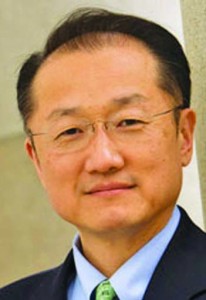
President Jim Yong Kim
Declaring corruption “public enemy number one” in developing countries, World Bank Group President Jim Yong Kim Wednesday described how the group is stepping up its fight against corruption.
He called upon developing world partners and the private sector to be part of the solution.
“In the developing world, corruption is public enemy number one,” said Kim, speaking at an event hosted by the World Bank’s anti-corruption investigative arm, the Integrity Vice Presidency.
“We will never tolerate corruption, and I pledge to do all in our power to build upon our strong fight against it.”
Important step
Kim was joined on stage by former World Bank President James D Wolfensohn, former U. S. Federal Reserve Chairman Paul Volcker, Transparency International Chair Huguette Labelle, and Philippines Finance Secretary Cesar V Purisima.
It was Wolfensohn in 1996 who publicly declared corruption a “cancer”, the first time a World Bank president spoke openly about the issue.
Kim described the pernicious effects corruption can have in developing countries. “Every dollar that a corrupt official or a corrupt business person puts in their pocket is a dollar stolen from a pregnant woman who needs health care; or from a girl or a boy who deserves an education; or from communities that need water, roads, and schools. Every dollar is critical if we are to reach our goals to end extreme poverty by 2030 and to boost shared prosperity.”
An important step toward fighting corruption and helping more people lead better lives is to build institutions with greater integrity, Kim noted.
He described three key elements in the World Bank Group’s approach: “First, we need to improve the way we share and apply knowledge about building institutions with greater integrity; second, we need to empower citizens with information and tools to make their governments more effective and accountable; and third, we need to build a global movement to prevail over corruption.”
Kim announced that the World Bank Group will be creating a single pool of technical experts in rule of law, public sector, financial and state management, and public procurement.
He said this “global practice on good governance” will become a major player in the anti-corruption effort for years to come.
Clean business practices
To show how progress can be made in the anti corruption fight, Kim gave specific examples of how the World Bank and its partners have had an impact on the problem.
“When corruption threatened to derail a critical power project for southern African countries, the World Bank intervened, preventing more than US$ 6 million from being misused. In Afghanistan, we supported the Network for Integrity in Reconstruction which trained 980 people who have monitored 281 infrastructure projects worth US$ 247 million.”
In addition to anti-corruption governmental action, Kim called on other partners to join the fight, including the private sector.
“The private sector has to be part of the solution as well. Oil, gas, and mining firms are increasingly disclosing their contracts with governments. This gives everyone a chance to scrutinise the behaviour of corporate and public officials.”
Kim noted that through innovative solutions in key sectors like engineering consulting, the World Bank has convinced major firms to commit to clean business practices.
Integrity Awards
At the event, three recipients of the World Bank’s “Integrity Awards” were honoured: the Royal Canadian Mounted Police, whose cooperation in an investigation resulted in World Bank sanctions and legal action; a senior financial management specialist whose vigilance in reviewing a project prompted corrective actions in the audit and treasury functions of the local government in China; and a person working in Timor Leste who unveiled fraud and corruption affecting US$ 44 million of World Bank-financed contracts.
“Inspired by these examples, the World Bank Group is more committed than ever to continue the fight against corruption – that will be a critical part of our work to end extreme poverty and to boost shared prosperity,” said Kim.



